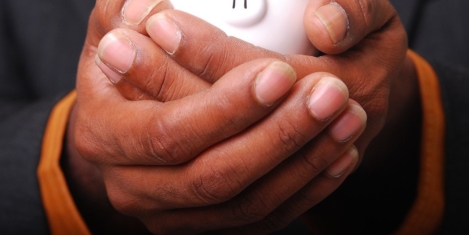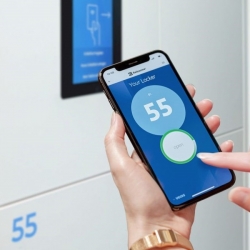To provide the best experiences, we use technologies like cookies to store and/or access device information. Consenting to these technologies will allow us to process data such as browsing behaviour or unique IDs on this site. Not consenting or withdrawing consent, may adversely affect certain features and functions.
The technical storage or access is strictly necessary for the legitimate purpose of enabling the use of a specific service explicitly requested by the subscriber or user, or for the sole purpose of carrying out the transmission of a communication over an electronic communications network.
The technical storage or access is necessary for the legitimate purpose of storing preferences that are not requested by the subscriber or user.
The technical storage or access that is used exclusively for statistical purposes.
The technical storage or access that is used exclusively for anonymous statistical purposes. Without a subpoena, voluntary compliance on the part of your Internet Service Provider, or additional records from a third party, information stored or retrieved for this purpose alone cannot usually be used to identify you.
The technical storage or access is required to create user profiles to send advertising, or to track the user on a website or across several websites for similar marketing purposes.
 Financial distress is more damaging to the wellbeing of the self-employed than those in employment, claims new research from Trinity Business School. According to the research, authored by Dr Martha O’Hagan-Luff at Trinity Business School, alongside fellow Trinity academics, financial problems are more strongly associated with lower levels of wellbeing for those that are self-employed. (more…)
Financial distress is more damaging to the wellbeing of the self-employed than those in employment, claims new research from Trinity Business School. According to the research, authored by Dr Martha O’Hagan-Luff at Trinity Business School, alongside fellow Trinity academics, financial problems are more strongly associated with lower levels of wellbeing for those that are self-employed. (more…)






 The greater stress companies put on financial incentives and financial performance in bonus systems for CEOs, the more negative the impact is on the firm’s financial performance, claims new research from
The greater stress companies put on financial incentives and financial performance in bonus systems for CEOs, the more negative the impact is on the firm’s financial performance, claims new research from 
 The way in which we work has changed in a way no one would have ever predicted as a result of last year’s pandemic. Consequently, many businesses have chosen to adopt to an agile working practise. This coupled with the rapid evolution of the hybrid workplace has allowed more employees than ever the flexibility to work from home, many people however still crave that interaction with colleagues, and the ‘corridor conversations’ that cannot be replicated via Zoom and can only happen with workplace collaboration.
The way in which we work has changed in a way no one would have ever predicted as a result of last year’s pandemic. Consequently, many businesses have chosen to adopt to an agile working practise. This coupled with the rapid evolution of the hybrid workplace has allowed more employees than ever the flexibility to work from home, many people however still crave that interaction with colleagues, and the ‘corridor conversations’ that cannot be replicated via Zoom and can only happen with workplace collaboration. 


 No-one could have predicted what 2020 would deliver. A pandemic, lockdown, moving the workplace into the home. We are in uncharted waters. The Oxford English Dictionary defines resilience as being able to withstand or recover quickly from difficult conditions. Resilience is an almost stoic quality, and a pandemic a time of crisis. It almost feels like they are a match made in heaven. But how does this affect organisations? What can be done? Is it really that important to build employees’ resilience?
No-one could have predicted what 2020 would deliver. A pandemic, lockdown, moving the workplace into the home. We are in uncharted waters. The Oxford English Dictionary defines resilience as being able to withstand or recover quickly from difficult conditions. Resilience is an almost stoic quality, and a pandemic a time of crisis. It almost feels like they are a match made in heaven. But how does this affect organisations? What can be done? Is it really that important to build employees’ resilience? 
 Data from thousands of employees across the country has been aggregated in a new report, detailing the mental wellbeing of the workforce over the course of the year. The research from
Data from thousands of employees across the country has been aggregated in a new report, detailing the mental wellbeing of the workforce over the course of the year. The research from 
 A review of research in organisational and workplace psychology conducted by an international team of academics claims that working from home has been more disruptive for women than men. The review paper, entitled
A review of research in organisational and workplace psychology conducted by an international team of academics claims that working from home has been more disruptive for women than men. The review paper, entitled 
 BlackRock is one of the largest asset management companies on the planet. Each year, at the start of January, the CEO Larry Fink writes a letter addressed to the other CEOs of the world. In his New Year’s letter for 2020, Fink appealed in particular to his fellow CEOs’ sense of social responsibility. In particular, he focused in on the risks faced by the climate. “Climate risk is an investment risk,” and he called on all companies, both public and private, to create greater societal added value. “Society is looking increasingly to companies to solve social and economic problems,” he concludes, so asset managers should be encouraged to invest in companies with a ‘purpose’.
BlackRock is one of the largest asset management companies on the planet. Each year, at the start of January, the CEO Larry Fink writes a letter addressed to the other CEOs of the world. In his New Year’s letter for 2020, Fink appealed in particular to his fellow CEOs’ sense of social responsibility. In particular, he focused in on the risks faced by the climate. “Climate risk is an investment risk,” and he called on all companies, both public and private, to create greater societal added value. “Society is looking increasingly to companies to solve social and economic problems,” he concludes, so asset managers should be encouraged to invest in companies with a ‘purpose’. 
 Only 46 percent of employers plan to hire a young person between the age of 16 and 24 in the next year despite new Government incentives to do so, a report from the
Only 46 percent of employers plan to hire a young person between the age of 16 and 24 in the next year despite new Government incentives to do so, a report from the 
 The pandemic has shaken up business priorities and many predict that it will continue to have lasting influence on the future direction of organisations. It is predicted that innovation and more compassionate leadership will take centre stage, according to a new study by ‘
The pandemic has shaken up business priorities and many predict that it will continue to have lasting influence on the future direction of organisations. It is predicted that innovation and more compassionate leadership will take centre stage, according to a new study by ‘
 With the continuous impact of the pandemic on people’s mental health due to isolation, work uncertainty, and anxiety over health, the topic has been dominating the news, begging the question of how we can achieve accessible and cost-effective treatment for all and prevent the expected acceleration of mental health issues in the coming months. As we juggle a different type of work-life balance brought about by working from home and the added worry of how the pandemic is affecting us, there is no doubt that our daily lives have been disrupted. The statistics are alarming;
With the continuous impact of the pandemic on people’s mental health due to isolation, work uncertainty, and anxiety over health, the topic has been dominating the news, begging the question of how we can achieve accessible and cost-effective treatment for all and prevent the expected acceleration of mental health issues in the coming months. As we juggle a different type of work-life balance brought about by working from home and the added worry of how the pandemic is affecting us, there is no doubt that our daily lives have been disrupted. The statistics are alarming; 







January 5, 2021
We shouldn’t become village idiots in our new ways of life
by Mark Eltringham • Cities, Comment, Flexible working, Technology